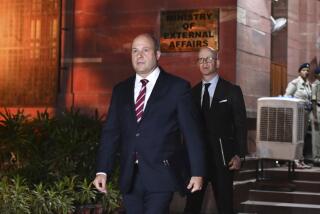London and Moscow Swap Expulsions : British Quietly Order 11 to Leave for Spying; Kremlin Retaliates
- Share via
MOSCOW — Britain and the Soviet Union locked diplomatic horns over the weekend, with Britain expelling or declaring persona non grata 11 Soviet citizens who were apparently caught spying and the Soviets responding with tit-for-tat expulsions, the British ambassador disclosed here Sunday.
The Soviet retaliation was out of step with improving British-Soviet ties, Ambassador Rodric Braithwaite told a news conference. “This is a mirror-image act of retaliation with no objective justification,” he said.
“We do not think this is in accordance with the way the relationship has been developing between the two countries, and we have no desire that it should affect wider political relations,” he said.
Soviet President Mikhail S. Gorbachev paid a three-day visit to Britain last month, holding talks with Prime Minister Margaret Thatcher and lunching with Queen Elizabeth II, who accepted in principle an invitation to visit the Soviet Union.
On Friday, Britain’s Foreign Office summoned the Soviet ambassador in London to inform him that five Soviet government officials and three Soviet journalists had to leave the country within two weeks and that three other Soviet government officials who already had left the country were declared persona non grata.
Euphemism for Spying
All 11 were accused of “activities incompatible with their status,” which is generally diplomatic language for spying. Britain’s ITN radio reported that the Soviets were caught spying on military installations.
Both sides ordered those expelled to leave within 14 days.
London chose not to publicize word of the expulsions. It went public only after the British ambassador was summoned to the Foreign Ministry in Moscow late Saturday night and told that eight Britons were being expelled, including three journalists, and that three diplomats who had already left the country were being declared persona non grata.
British officials here privately expressed surprise and disappointment with the Soviet response.
“We have a generally productive relationship with the Soviet Union. We had hoped the inconveniences caused by unofficial behavior in London that led to the expulsions there were behind us. This was unfortunately not the case,” one British official said here in an interview, asking that his name not be used.
‘Unjustified Retaliation’
“The way we chose to handle it--without publicity--was in part a signal that we wanted to continue the positive part of our dialogue,” the official said. “The unjustified retaliation shows that some people in the Soviet government do not have that positive attitude toward our relationship.”
Braithwaite identified the three journalists ordered to leave as Angus Roxburgh of the Sunday Times, Ian Glover-James of Independent Television News and Jeremy Harris of the British Broadcasting Corp.
The eight diplomats were identified as second secretaries Michael Anderson and Adam Noble, third secretary Paul Sharp, naval attache Capt. Christopher Meyer, assistant naval attache Lt. Christopher Watson, assistant military attache Nigel Shakespeare, vice-consul Helen Pickering and Warrant Officer Laing Purfit.
“The country is going through some very exciting changes, and I am very disappointed that my assignment should end like this,” Glover-James, 41, said.
Roxburgh, who first came to the Soviet Union as a student 10 years ago, said he was stunned when told Sunday that we was being expelled.
‘I Feel Very Close to It’
“The reason I feel so sad about it is that I am 35 years old and I have spent half my life studying Russian and the Soviet Union. I feel very close to it,” he said.
The Soviets ordered to leave London were not identified.
Recent expulsions of Soviet diplomats from Western countries--for instance when the United States expelled a Soviet military attache in March--have resulted in immediate expulsions of the same number and rank of diplomatic representatives from Moscow.
The latest expulsions are the first of their kind since the Soviet Union and Britain expelled 31 of each other’s citizens in two groups in 1985. The deportations then began when London ordered 25 Soviet embassy staff members, journalists and trade officials to leave after the defection of an alleged Soviet spy chief, Oleg Gordievsky.
The Soviet Union then ordered 25 Britons to leave Moscow, London expelled six more Soviets and Moscow ordered six more Britons to leave before the expulsion war was over.
More to Read
Sign up for Essential California
The most important California stories and recommendations in your inbox every morning.
You may occasionally receive promotional content from the Los Angeles Times.













